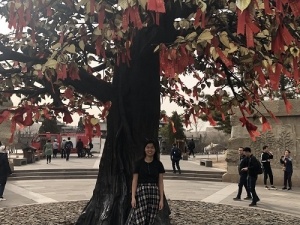Written by Kira Porter, (University of Massachusetts, Amherst) Student Correspondent CET Beijing, Spring 2019

As a Chinese adoptee (I was born in China and adopted as a baby, after which I grew up in the U.S.), my Chinese appearance means that people I encounter throughout my semester abroad naturally expect me to understand Chinese and be versed in the language of daily life here in Beijing. Although my Chinese heritage is something that I value as a part of my identity, so too is my New England upbringing, which is usually unnoticed in China. I tend to blend in here, even (or especially) when standing among those classmates of mine who don’t share an Asian heritage. Passing as a Chinese person in China, like most things, has its pros and cons, which surprised me in their complexity.
As a New England native, seasoned when it comes to enduring colder weather, I habitually wear sweatshirts rather than heavy winter jackets on 50-to-60-degree days, or a T-shirt once it hits 65 or so. It is through this before anything else in my appearance that people in Beijing identify me as a non-native. I am asked everywhere I go, “Aren’t you cold?” by surprised strangers in supermarkets, in subway stations, even as they pass me on the streets. Although this question can get a bit old after hearing it three or more times in the same day several days a week, it’s also a question that lights an inner pride in me.
When you commit to spending a whole semester or more studying and speaking nothing but Chinese, this decision comes with the knowledge that there are not many others who have chosen such a rigorous path. The gains you will make are cause for excitement, and the satisfaction you carry in your decision lasts you all the way to China. Actually, it persists after your plane touches down and you meet your classmates at CET. Here, you are no longer unique in your commitment, but you now share a distinct bond with these people, who for whatever reason made the same bold choice. There is a joy in this, to be sure, a unifying force among you.
And yet, while you are all brought together through your language learning and cultural immersion commitment, there is also a divergence in experience based on appearance. If you pass as Chinese, whether that means you have some Chinese roots or another variation of East-Asian heritage, this often means that while your new, foreign-looking classmates get approached by giggling elementary school kids looking to get a photo with a foreigner, you tend to be overlooked. It’s natural to be envious of the energy when people are looking for a chance to practice their long-worked-for English knowledge or get insights into American life, but they don’t know they can seek you out for friendly conversation as well.

It’s common, in fact, to be asked on the sidewalk where different buildings are on campus, as if you’re a regular student there, or approached by rapid-speaking salespeople and an onslaught of unfamiliar words. You learn to shrug off the embarrassment when you draw weird looks because you don’t know how to function in basic, everyday life. This may sound silly, but when I first arrived it took me a few days to understand which doors you push (or pull; they often go either way, really), which ones you slide, and which ones aren’t going to slide (in which case there is usually a side door in very plain sight that perhaps you’ll need a minute or two of confused glancing around to notice- it happens). When you first arrive, you likely don’t yet have a fully functional WeChat account or subway pass, when these are basically essentials that every Beijinger seems to possess. Fixing such basic issues can feel a bit awkward as someone who looks like they ought to have had this stuff figured out a long time ago (at least things like setting up accounts are generally one-time ordeals). And finally, after you have spent some time in China and under the language pledge, I think it is pretty common to start craving some Western sights and experiences, however much they may feel like a good cause for guilt. Sometimes you may feel the need even to lock eyes with fellow foreigners as you pass them on the sidewalk and commiserate for a moment. Unfortunately, this is another struggle, as your fellow foreigners will also perceive you as a Chinese person, a letdown that can also get you down if you let it. Really, I don’t entirely kid on this one (at least, this has been the way of my experience), but this, with everything else, is something to face with the inner knowledge of who you are.
However, trust me when I say it is definitely not all bad to be mistaken for a Chinese person. Non-Asian-looking classmates have their own set of troubles. Some have observed that their Chinese speaking abilities are at times judged before they’ve even opened their mouth; though their abilities might far surpass mine, their well-spoken, hard-worked-for Chinese might be dismissed as unintelligible at the onset. Meanwhile, it is to Asian-American classmates that waiters and other Chinese people often turn for assistance in communicating with them. In this way, we have the advantage of camouflage, so to speak, a unique opportunity. We can go places and pass for Chinese people (at least, in most cases, until we need to speak), able in this way to explore China without drawing special attention. It’s easier to pass through local neighborhoods and less-traveled areas without feeling disruptive or feeling you’re constantly under examination. And when people do find out that you’re learning Chinese, that you didn’t grow up in China, there’s a special delight to that, too.

It can be fun to surprise someone (kindly) that you actually haven’t comprehended at all what they just said, that actually, you’re a foreigner discovering their country as well. When they laughingly tell you that they assumed you were also Chinese, it’s nice to be able to sympathize, to say no hard feelings, to crack into the regular conversation of, “Where are you from and what attracted you to come to Beijing?” People tend to be quick to open up if they have the time, interested in your perspective and happy to teach you something you didn’t know. If you’re comfortable with it, you can almost always count on having a conversation starter; when people find out I’m adopted, they, like people everywhere, are curious about my backstory, and about why I chose to return to China. Do I want to find my birth parents? It’s cool that I’m still interested in learning more about my heritage.
In the end, I think it can’t really be said whether it’s better to look like a foreigner when you study abroad in China. There are pros and cons on both sides, and the ultimate thing to do is to be aware but to use your opportunity to spend the semester learning about China to its fullest, regardless of how your situation is judged by others. Either way, throughout your program you will find the opportunities you need to explore what you’re looking to explore and to create your own, memorable experience.